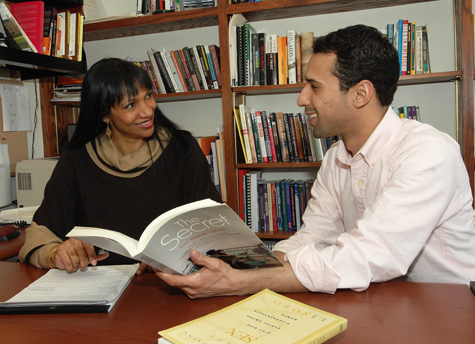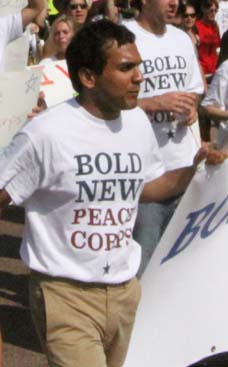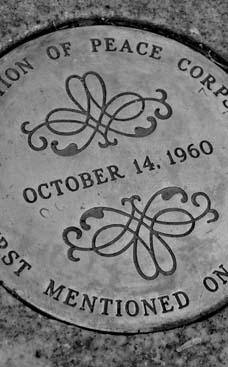
"As a volunteer in Kenya, I worked near the Ugandan border, which was a success story for HIV," Parikh says. "The president of Uganda was known internationally as being the first head of state to aggressively and publicly tackle HIV." Parikh says Uganda's rate of HIV was as high as 19 percent in the early 1990s. But through aggressive campaigns and structural changes, the country was able to drastically reduce that number. She was drawn to study in Uganda for those reasons, and because the country was in the process of rebuilding after emerging from a 25-year civil war. "The idea of nation-building was anthropologically exciting to me," Parikh says. "I wanted to look at how a nation re-imagines itself after that many years of civil unrest and war. I also wanted to examine development in Uganda and what large amounts of foreign aid do to a nation-state." Even though she was in Kenya primarily as a business adviser, Parikh realized that she couldn't help but to look at the world through anthropological lenses. "I became increasingly interested in how society works, how conflict gets resolved, hierarchies, inequalities, social change and local politics," Parikh says. "That's when I knew I definitely wanted to be an anthropologist."
Kenya RPCV Shanti A. Parikh examines structures of inequality surrounding issues of sexuality and gender
Through anthropological lenses
Parikh examines structures of inequality surrounding issues of sexuality and gender
January 21, 2011
By Neil Schoenherr
Caption: Shanti A. Parikh, PhD, associate professor of anthropology and of African and African-American studies, both in Arts & Sciences, talks in her office with Sean Marz, 2006 WUSTL alumnus and community liaison for Parikh's community-based learning course, "Sexual Health and the City." "Shanti is a wonderful colleague," says T.R. Kidder, PhD, professor and chair of anthropology. "Her dedication to teaching and student mentoring is remarkable. Despite being a tough, no-nonsense teacher, students flock to her courses, and she is in constant demand to advise honors theses and to serve on student committees." Photo: David Kilper
Growing up in Maryland, Shanti A. Parikh knew early on she wanted to be an anthropologist.
But at the encouragement of her mother, who "wondered what I'd do with an anthropology degree," Parikh majored in finance at the University of Virginia.
A stint in the Peace Corps following graduation returned Parikh to her original passion and to the area of study that would remain her lifetime focus.
In the Peace Corps, Parikh, PhD, associate professor of anthropology and of African and African-American studies, served as a small business adviser in Kenya.
During her two-year service, Parikh was overwhelmed by the number of residents, including some of her co-workers, who were affected by HIV.
"As a volunteer in Kenya, I worked near the Ugandan border, which was a success story for HIV," Parikh says. "The president of Uganda was known internationally as being the first head of state to aggressively and publicly tackle HIV."
Parikh says Uganda's rate of HIV was as high as 19 percent in the early 1990s. But through aggressive campaigns and structural changes, the country was able to drastically reduce that number.
She was drawn to study in Uganda for those reasons, and because the country was in the process of rebuilding after emerging from a 25-year civil war.
"The idea of nation-building was anthropologically exciting to me," Parikh says. "I wanted to look at how a nation re-imagines itself after that many years of civil unrest and war. I also wanted to examine development in Uganda and what large amounts of foreign aid do to a nation-state."
Even though she was in Kenya primarily as a business adviser, Parikh realized that she couldn't help but to look at the world through anthropological lenses.
"I became increasingly interested in how society works, how conflict gets resolved, hierarchies, inequalities, social change and local politics," Parikh says. "That's when I knew I definitely wanted to be an anthropologist."
Maintaining ‘the secret'
Parikh began a doctoral program at Yale University in 1993, completing a dissertation on youth sexuality in Uganda. She came to WUSTL in 2000 as a postdoctoral student and was hired as a tenure-track faculty member in anthropology a year later.
Parikh, who also holds appointments in Women, Gender, and Sexuality Studies and in Urban Studies, both in Arts & Sciences, is the first African-American woman to come up through the ranks and be granted tenure in Arts & Sciences at WUSTL.
Broadly speaking, her research focuses on structures of inequality surrounding issues of sexuality, particularly gender, sexual and reproductive health, courtship, romance and marriage, and regulation.
Parikh's first co-authored book, The Secret: Love, Marriage, and HIV, was released in early 2010. The book is the result of a four-year National Institutes of Health grant to examine married women's HIV risk in five countries: Uganda, Vietnam, New Guinea, Mexico and Nigeria.
"Research has shown that women's greatest risk for HIV is sex with their husbands or permanent partners," Parikh says. "Hence, we were interested in understanding their husbands' extramarital liaisons as a site of marital HIV risk.
"So, in reality, the book is about masculinity and the ways in which societal structures facilitate men's extramarital encounters," she says. "The book also considers how both husbands and wives, in their desire to achieve the public face of a ‘modern' marriage, remain silent about men's infidelities and collude in maintaining ‘the secret,' the title of the book.
"We are arguing against the idea that male infidelity is about bad culture or men's individual failings," she says. "Instead, we are interested in teasing out the wider factors, including global capitalism, sexual geographies or even policies, that create ‘opportunity structures' for men to participate in extramarital sexuality. We are not excusing their behaviors; rather, we are trying to understand how infidelity is itself is socially produced and organized."
Examples of that include men traveling to work in the mines for months at a time without housing accommodations for their families or taking jobs as long-distance truck drivers who are away from their wives for nine months out of the year.
Her first single-authored book, based on 10 years of ethnographic research, is called Regulating Romance: Youth Sexuality, Moral Anxiety, and Love Letters in Uganda's Time of AIDS and is due out later this year.
The book examines how HIV and other interventions intended to "protect" youth have transformed local landscapes in ways that may have unexpectedly created new avenues for risk for young people. It also includes love letters from Ugandan youth, looking at how young people imagine romance and what they want from a romantic partner.
"Young people in Uganda hear about sexual risk separately from sexual pleasure," Parikh says. "I'm interested in how they navigate the differences between risk and pleasure in their love letters."
Parikh teaches courses on global AIDS, a theory course on sex, gender and power and a freshman seminar on problems in contemporary Africa. She also has started offering a community-based learning course where students partner with sexual and reproductive health agencies in St. Louis.
‘In constant demand'
Parikh was a Fulbright New Century School Fellow in 2004-05. The theme for that year's fellowship was "Towards Equality: The Global Empowerment of Women."
Emerging from her interaction with other international fellows, Parikh helped organize a conference on global feminism at the university in 2006, sponsored by African & African American Studies; Women, Gender, and Sexuality Studies and International and Area Studies, all in Arts & Sciences.
She also leads the Mellon Mays Undergraduate Fellowship with Joseph Thompson, PhD, senior lecturer in African & African-American Studies.
The program encourages talented students from historically underrepresented ethnic groups to develop their academic interests to the fullest, obtain doctoral degrees and pursue careers in higher education.
"Shanti is a wonderful colleague," says T.R. Kidder, PhD, professor and chair of anthropology. "Her dedication to teaching and student mentoring is remarkable. Despite being a tough, no-nonsense teacher, students flock to her courses, and she is in constant demand to advise honors theses and to serve on student committees.
"She balances these demands on top of an exceptionally complicated research agenda that requires extensive fieldwork in Uganda, writing grants for highly competitive agencies, publishing and service to the department and the university," Kidder says. "As if that isn't enough, Shanti is raising two kids, hosting a student from Uganda and serves on community boards."
Parikh was a co-recipient of this year's Rosa L. Parks Award, an award given to persons and/or organizations that exemplify the valor of both Dr. Martin Luther King, Jr. and Rosa L. Parks.
Her next project is "The Gendered Spectrum of HIV Care." The collaborative project will look at gender and equality in HIV care in Uganda, South Africa and Nigeria.
Parikh is married to Jason K. Wilson. The couple has two boys: Jason, 3, and Julian, 11 months. A research assistant from Uganda also lives with them while she attends college in St. Louis.
Parikh hopes to branch out her research to begin a project in the United States. She would like to examine some aspect of sexual health, masculinity, youth and gender in this country.
She has been involved in efforts to translate her research findings into U.S. international sexual health policy. She has been working with the Center for Health and Gender Equity to encourage policymakers to revise the U.S. President's Emergency Plan for AIDS Relief guidelines to better reflect the realities of people's sexual risk.
"My involvement with the ‘translational' work has been very rewarding, and I hope to do more of it in the future," Parikh says.
She definitely likes to stay busy.
"If you want an example of a young professor who does it all, Shanti is a prime candidate," Kidder says.
Fast facts about Shanti A. Parikh
Title: Associate professor of anthropology and of African & African-American Studies, both in Arts & Sciences.
Appointments in: Women, Gender, and Sexuality Studies and in Urban Studies, both in Arts & Sciences.
Forthcoming book: Regulating Romance: Youth Sexuality, Moral Anxiety, and Love Letters in Uganda's Time of AIDS, due out later this year.
Hobbies: Taking her children to museums, parks, the Saint Louis Science Center and the Saint Louis Zoo.















